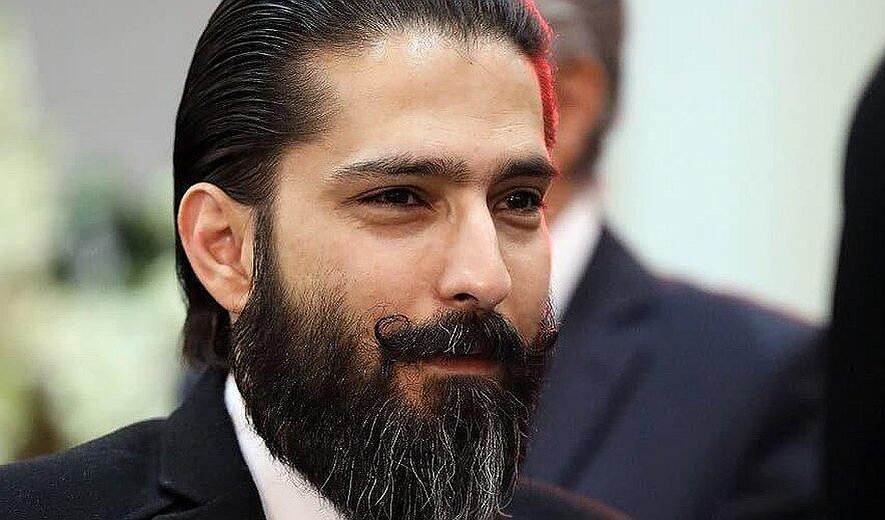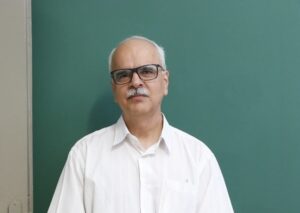برای خواندن این مطلب به فارسی اینجا را کلیک کنید
Amirsalar Davoudi, an attorney jailed in Evin prison for his human rights work, has made a mark through his commitment to truth and justice. Though his path has been fraught with significant hardship, whether it was receiving pushback for his outspoken dissent in his early education or being sentenced to bogus charges by the Islamic Republic, Davoudi’s determination has never diminished.
Born on June 21st, 1981, as the second of five children, Davoudi grew up in a middle-class family where his father held a position at the Ministry of Oil and his mother was a homemaker. Davoudi began his endeavors in humanities subjects at Farhang High School. However, his time there was short-lived, lasting only a year, as his unconventional inquiries and remarks irked the school’s administration and alumni, causing disruptions. Davoudi’s parents ultimately opted to transfer him to a different school instead of trying to silence him. Upon completing high school, he took part in the national entrance examination in 2000, which led him to study law at the prestigious Allameh Tabatabai University.
During his time at university he experienced the height of the reformist government’s influence, a period when student organizations flourished and students were more enthusiastic about engaging in university life. He responded to this environment by actively participating in extracurricular activities at the college hall and advocating for union demands, ultimately becoming the elected student representative in the inaugural term of the university union council.
Davoudi was influenced by dedicated professors including Dr. Mohammad Mohammadi Gorgani, Dr. Mohammad Sharif, Dr. Morteza Mardiha, and Dr. Ahmad Khaleghi, among others, who actively contributed to civil and human rights organizations and facilitated effective communication between students and these professionals. Within the intimate setting of the university, discussions took place involving the Lawyers’ Association,Human Rights Defenders Association, Association for the Defense of Prisoners’ Rights, and even political parties such as the Mardomsalari Party. This nurturing environment enabled Davoudi and his peers to gain a deeper understanding of the practical elements of their university education and the professional roles they could play in society.
Davoudi engaged in the voluntary human rights courses led by Dr. Sharif who, aside from being part of the Human Rights Defenders Association, often advocates for various political and ideological detainees. This connection provided a chance for him to persistently work alongside and cooperate with his professor after finishing his undergraduate education in 2004.
Upon finishing his military service, he joined the association and acquired his Bar License, being recognized as a “basic lawyer of justice.”
In 2011, Amirsalar Davoudi experienced significant milestones and achievements in his personal life. In March 2011, he married Tanaz Kolahchian. They had first encountered each other a year prior, in March 2010, during the Bar Association General Assembly, where they were both attending as members of the Bar Association and practicing lawyers in the judiciary. Half a year into their marriage, in October of the same year, they established a joint legal practice on Valiasr Street in Tehran.
As social media gained popularity in Iran, Davoudi was able to connect and inform citizens directly through his personal accounts.he most renowned platform he utilized was the Telegram channel “Without Retouch,” where he shared news, views, and opinions, as well as highlighted content from the association of lawyers.
In November 2018, after discussing corruption within the judicial system and asserting that a portion of the country’s judiciary is tainted by financial corruption in a conversation with Voice of America, a case was initiated against Davoudi. He was subsequently summoned and examined by the “Culture and Media Court,” which determined that the interview did not warrant prosecution and punishment. However, not long after, the “Information Protection of the Judiciary” presented a separate request to the Tehran prosecutor to pursue charges against him, ultimately leading to his arrest.
On November 20, 2018, Davoudi was apprehended in his office by law enforcement officers who conducted a search of his workspace. The arrest occurred as a result of a complaint filed by the judiciary’s information protection department, citing charges that included “establishing a virtual group,” “spreading propaganda against the government,” “disparaging the leader and originator of the revolution,” “offending individual persons,” and ultimately “spying,” as determined by the investigator from Branch 2. Following a two-month interrogation period, the case was forwarded to the Revolutionary Court by the Security Prosecutor’s Office.
Amir Raisian, Davoudi’s legal representative, close friend, and former university classmate, stated that the charges against his client include spreading falsehoods, promoting dissent against the government, defaming the founder and leader of the Islamic Revolution, and plotting to engage in security offenses. The case also encompassed allegations of disrespecting real individuals such as Ayatollah Larijani. The “espionage” charge was based on giving interviews to international TV stations like VOA, discussing his client’s health issues within the prison and their judicial circumstances.
Davoudi’s attorney disclosed that an unanticipated development occurred following the indictment – a separate case against Davoudi was launched in parallel to the original charges. In this new case, his client’s interviews led to the charge of collaborating with the adversarial U.S. government, which Raisian objected to strongly as unwarranted and in violation of legal procedure.
In the end, the two accusations were forwarded to the Revolutionary Court’s 15th Branch, where the presiding judge declared him culpable for nearly all counts. In June 2019, the Revolutionary Court’s Branch 15 handed down an initial verdict on the matter. As per this judgment, Davoudi was sentenced to a total of 30-years imprisonment, 111 lashes, and a monetary penalty. However, Davoudi was acquitted of the charge of collaborating with the hostile American government.
Following the declaration of the judicial decision, Kolahchian, Davoudi’s spouse, revealed in a tweet that her partner chose not to object to this ruling. As per Kolahchian, Article 138 stipulates that a stringent penalty, specifically fifteen years of incarceration, for establishing a group (Telegram channel) can be imposed.
On June 3, 2018, after the court verdict was published on June 11 and adherence to the initial judgment (no appeal filed by the defendant), the officers eventually moved Davoudi from the Judicial Information Security Detention Facility to the Evin Prison’s general section, completing 190 days.
Subsequent to this phase, the attorneys representing him chose to continue the legal process, and with his consent, a petition for restoration was submitted to the Supreme Court. In the wake of the court ruling being breached by the Supreme Court and the case being referred back to the original division, Davoudi secured temporary release from incarceration after a duration of two and a half years by providing a bail amount of two billion Tomans in July 2021.
The temporary nature of this release became evident when, just over a year later on June 5, 2022, Kolahchian’s Twitter account announced his return to Rajaei Shahr prison. Citing a knowledgeable source, the Harana news agency reported: “Mr. Davoudi’s sentence was unexpectedly enforced as he visited the Evin Prosecutor’s Office to examine his case, ultimately leading to his arrest and relocation to Rajaei Shahr prison.” In a discussion with the Iran Watch website, Raisian, the counsel for the accused, mentioned that Branch 28 of the Revolutionary Court reaffirmed Mr. Davoudi’s prior 30-year incarceration sentence. Davoudi’s provisional freedom had only lasted for a year.
On September 23, 2022, Vokla Press reported that the jury in Bordeaux, France had named him the winner of the 2022 Ludovic Terrario Human Rights Award. According to the founder of the award, Bertran Favreau, the decision to award Davoudi was a testament to “the victory of democratic forces and human rights defenders”.
It is important to note that this accolade serves as a tribute to the French attorney Ludovic Terrario, the founder of the French Human Rights League in 1898. In 2018, the award was presented to Nasrin Sotoudeh, a fellow human rights lawyer from Iran.
Throughout the years, Davoudi has endured numerous hardships during his time in prison, including contracting COVID-19 and being transferred to Rajaei Shahr prison. However, as a lawyer imprisoned for defending human rights, he has consistently endeavored to make the best of his situation. Utilizing his platform and social capital, he has sought to advocate for humanitarian rights and express his viewpoints to his fellow citizens.
We eagerly anticipate Davoudi’s liberation to exercise law uninhibited by political persecution, and the moment when Davoudi, along with other human rights lawyers, contribute to securing the lawful assurance of freedom for innumerable political detainees.
Back to top
